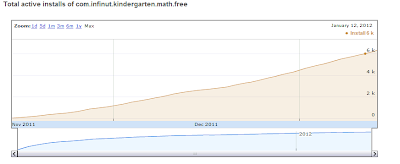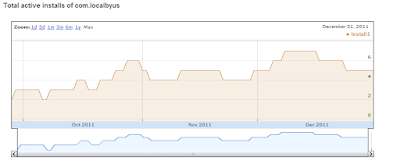RIM, the owner of Blackberry brand, has a tablet on the market - Playbook. It is originally not an Android tablet. But, with v2.0 of it's operating system, it is integrated with the android runtime. So, it will be running android apps. This is good news for android developers who want to reach a broader audience. However, the existing APK files need to be repackaged for Blackberry to a bar file, and submitted to blackberry specific market.
Why couldn't they just use the standard android packaging, and markets? I assume it's because they want a share of the app sales. The special purpose android tablets are not selling very well, even with high-quality-specs like the Playbook. It is because customers want apps that their friends have. And developers, like me, are too lazy to port their apps, or even repackage them.
Getting desperate for apps for the blackberry playbook, RIM
announced they would give a free playbook per app submitted to the blackberry market. That is a pretty good offer for me, given that I need a tablet anyway to test my apps on a larger screen. So, I submitted
Kindergarten Math to blackberry vendor portal today.
Creating the Bar file from an existing APK file was fairly simple. There was an
online tool to convert the file. It did require Java installation for Applets, and the Android SDK pre-installed, but, I already had those for development purposes. Since we don't use any special permissions, the conversion was a breeze.
Testing the converted app was anything but easy. My husband spent a few hours last night setting up the VM, getting it all configured, installing the app on the VM. Finally, when he tried to run it, it would load the app, but not be able to take any user input. The emulator for blackberry playbook is pretty much useless. Not having an actual playbook, we just have to trust that it all works how it does on the android phone, and submit the app before the deadline. If RIM keeps it's promise and sends us a Playbook, we can test the app on it then.
The submission to the
Blackberry App Vendor Portal was tedious, at a minimum. Vendor account took overnight to get approved. When submitting the app, you have to fill out 5 step wizard. You cannot save the steps. So, if you don't have some information right away, and want to come back to it later, you have to start all over again. The images are non-standard pixel sizes - 480 X 480 instead of 512 X 512. And, there is a confusing array of licensing, and tax information fields. I ended up with fixed pricing and static licensing to avoid last minute integration with blackberry playbook SDK. I am not sure what the tax reporting stuff meant. The documents were not clear on what you should choose if you are a corporation vs. a sole proprietor.
Still, kudos to RIM, for upgrading their OS to use Android and doing a promotion that publishers can appreciate. It seems windows phone will integrate more seamlessly with Android apps. Windows 8 has an
Android app runner called
BlueStacks. Now, if only iPhone and iPad would run Android apps... all the tablet and phone devices would be covered by the same technology stack for developers.
It is amazing that 15 years after it was created for phones, Java is finally the most prevalent platform for smart-phones.
Update on 4/10
Blackberry sent us a playbook in return for submitting Kindergarten Math to their store. A customer reported that the application hangs when run. So, we decided to test it out. Also, by now we have a new version. I rebuilt the application as described above. Then to load the application to the blackberry device, we enabled the developer mode on blackberry and used command line to deploy the application.
c:\blackberry.tools.SDK\bin>blackberry-deploy -installApp -device <device ip> -package <location of bar file> -password <dev password setup for blackberry>
We also tried the eclipse plugins, but, they kept erroring out for one reason or another. The blackberry eco-system is still rather fragile. I think they have devoted time and effort to make the android apps work, but in their zeal for security, they have made it much harder to get things actually working - even for a developer. I tried updating Kindergarten Math Lite to redirect to blackberry market. Their security is so tight, they don't even allow apps to direct to their own market!
Kindergarten Math essentially worked on the playbook. But, there are differences in how it works on stock Android or even Kindle Fire. You can get a back button by swiping down from the top of the playbook, but it doesn't always work. It works when going back from settings, but, not when going from one activity to another in the application - another security feature? Who knows. There isn't much documentation available on it.
I had to do the update for the few people who have already bought the app, but I am not sure if I want to continue supporting it.








